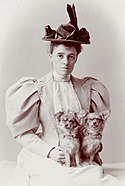Edith Wharton Quote
His own exclamation: Women should be free—as free as we are, struck to the root of a problem that it was agreed in his world to regard as nonexistent. Nice women, however wronged, would never claim the kind of freedom he meant, and generous-minded men like himself were therefore—in the heat of argument—the more chivalrously ready to concede it to them. Such verbal generosities were in fact only a humbugging disguise of the inexorable conventions that tied things together and bound people down to the old pattern.
Edith Wharton
His own exclamation: Women should be free—as free as we are, struck to the root of a problem that it was agreed in his world to regard as nonexistent. Nice women, however wronged, would never claim the kind of freedom he meant, and generous-minded men like himself were therefore—in the heat of argument—the more chivalrously ready to concede it to them. Such verbal generosities were in fact only a humbugging disguise of the inexorable conventions that tied things together and bound people down to the old pattern.
Tags:
freedom, gender inequality
Related Quotes
She was a gypsy, as soon as you unravelled the many layers to her wild spirit she was on her next quest to discover her magic. She was relentless like that, the woman didn't need no body but an open r...
Nikki Rowe
Tags:
adventure, artist, authentic, balance, brave heart, courage, empowering women, free spirit, freedom, growth
About Edith Wharton
Edith Wharton (; born Edith Newbold Jones; January 24, 1862 – August 11, 1937) was an American writer and designer. Wharton drew upon her insider's knowledge of the upper-class New York "aristocracy" to portray realistically the lives and morals of the Gilded Age. In 1921, she became the first woman to win the Pulitzer Prize in Fiction, for her novel The Age of Innocence. She was inducted into the National Women's Hall of Fame in 1996. Among her other well known works are The House of Mirth, the novella Ethan Frome, and several notable ghost stories.
